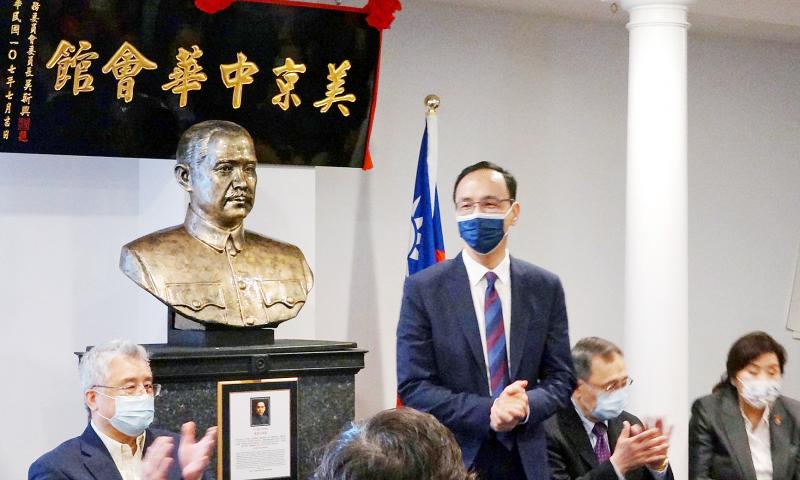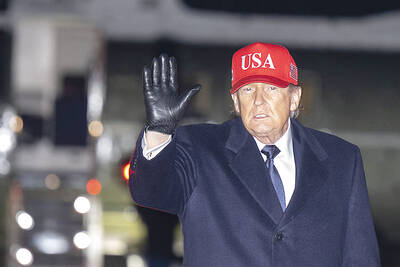Chinese Nationalist Party (KMT) Chairman Eric Chu (朱立倫) has reiterated the KMT’s historically close ties with the US, saying that the party continues to fight against communism and compete with the Chinese Communist Party regarding values and political systems, the KMT said in a statement yesterday.
Chu, who is on an 11-day trip to the US, made the remarks during a visit to the Hoover Institution at Stanford University in California on Thursday, and highlighted that the KMT and the US share memories of fighting side by side.
The US and China, which was ruled by the KMT at the time, were allies during World War II, and more than 250,000 US personnel served in what was known as the “China-Burma-India” theater.

Photo: CNA
The KMT has fought against communism for the past 100 years and in bloody battles to defend Taiwan, but is still willing to maintain exchanges with China’s private sector, Chu said.
While at the Hoover Institution, Chu met with US experts and academics, including political sociologist Larry Diamond and political scientist Kharis Templeman, discussing issues related to cross-strait security and relations.
The US academics raised concerns about Taiwan’s local government elections at the end of the year, to which Chu expressed cautious optimism, the KMT said in the statement.
In addition to controlling more than two-thirds of the counties and cities in Taiwan, the KMT would field outstanding candidates to challenge for the municipalities, counties and cities that it does not control, Chu said.
At a press event with Taiwanese media in Washington on Sunday, Chu said he would reopen the KMT’s representative office in the US after 14 years.
Chu said the KMT, Taiwan’s main opposition party since 2016, had not had a voice in Washington since the closure of its representative office, and the aim of reinstating it was to enable the US to better understand the party’s position and the different voices of Taiwan.
The chairman is to attend a plaque-unveiling ceremony to reopen the KMT’s liaison office in Washington tomorrow. The party closed it in 2008 shortly after the election of Ma Ying-jeou (馬英九) as president.
Asked if the move was in any way linked to him possibly running for the presidency in 2024, Chu rejected the idea, saying that it was part of his job as the party chairman to engage in party politics.
Reopening the office would also establish a communications channel with the US for future KMT presidential candidates, Chu added.

Taiwan has received more than US$70 million in royalties as of the end of last year from developing the F-16V jet as countries worldwide purchase or upgrade to this popular model, government and military officials said on Saturday. Taiwan funded the development of the F-16V jet and ended up the sole investor as other countries withdrew from the program. Now the F-16V is increasingly popular and countries must pay Taiwan a percentage in royalties when they purchase new F-16V aircraft or upgrade older F-16 models. The next five years are expected to be the peak for these royalties, with Taiwan potentially earning

STAY IN YOUR LANE: As the US and Israel attack Iran, the ministry has warned China not to overstep by including Taiwanese citizens in its evacuation orders The Ministry of Foreign Affairs (MOFA) yesterday rebuked a statement by China’s embassy in Israel that it would evacuate Taiwanese holders of Chinese travel documents from Israel amid the latter’s escalating conflict with Iran. Tensions have risen across the Middle East in the wake of US and Israeli airstrikes on Iran beginning Saturday. China subsequently issued an evacuation notice for its citizens. In a news release, the Chinese embassy in Israel said holders of “Taiwan compatriot permits (台胞證)” issued to Taiwanese nationals by Chinese authorities for travel to China — could register for evacuation to Egypt. In Taipei, the ministry yesterday said Taiwan

‘LIKE-MINDED PARTNER’: Tako van Popta said it would be inappropriate to delay signing the deal with Taiwan because of China, adding he would promote the issue Canadian senators have stressed Taiwan’s importance for international trade and expressed enthusiasm for ensuring the Taiwan-Canada trade cooperation framework agreement is implemented this year. Representative to Canada Harry Tseng (曾厚仁) in an interview with the Central News Agency (CNA) said he was increasingly uneasy about Ottawa’s delays in signing the agreement, especially as Ottawa has warmed toward Beijing. There are “no negotiations left. Not only [is it] initialed, we have three versions of the text ready: English, French and Mandarin,” Tseng said. “That tells you how close we are to the final signature.” Tseng said that he hoped Canadian Prime Minister Mark Carney

The US’ joint strikes with Israel on Iran dismantled a key pillar of China’s regional strategy, removing an important piece in Beijing’s potential Taiwan Strait scenario, said Zineb Riboua, a senior researcher at the Hudson Institute’s Center for Middle East Peace and Security. In an article titled: “The Iran Question Is All About China,” Riboua said that understanding the Iran issue in the context of China’s “grand strategy” is essential to fully grasp the complexity of the situation. Beijing has spent billions of dollars over the years turning Iran into a “structural strategic asset,” diverting US military resources in the